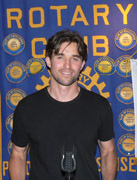Five Ways to Save the Planet, by Greg Schwartz

Gregory Schwartz grew up in the Los Angeles area. He graduated from the University of California at Berkeley and played football and baseball there. After playing professional football for one season in Vienna, Austria, he got a graduate degree in Geography at the University of Wisconsin. He began teaching high school Spanish in Los Angeles in 1995. In 2006 he began teaching Geography at California State University Northridge while writing his 2nd book, 5 Ways to Save the Planet (In Your Spare Time). He has traveled to 40 countries, but lives in Manhattan Beach.
In his travels, he has seen both abundance and suffering, and kept asking himself, what is the cause of the suffering? He saw starvation, war and environmental degradation. 15,000 children starve to death every day. 30 million gallons of oil spill into the oceans every year. 90,000 acres of rainforest are burned every day (1 acre/second). Our 10 hottest years recorded on this planet have all been in the last 15 years.
Meanwhile, there are 10 million cars in Los Angeles. The US generates one and a half billion pounds of trash daily. We use much more energy and water per capita than any other country. 4 million tons of food is thrown away in California every year. There are 10 million millionaires in the US, while millions of people on this planet try to survive on 2 dollars a day.
Looking for alternatives, he sees achievable change occurring in small ways by individuals doing what they can. We can each help by increasing renewable energy sources such as solar and wind, and promoting organic farming to reduce the ever-increasing load of pesticides in our food, water and environment. Bill Gates has given $25 billion to world health issues (including many hundreds of millions to help Rotary eradicate polio). There are thousands of nongovernment organizations with dedicated volunteers, who are less prone to corruption and misuse of resources than some government officials.
Some solutions already exist. He believes famine is caused more by maldistribution, political conflict, disease and public health problems, and progressing climate change that we have not adequately prepared for. What holds us back is what we believe, not what we have. We focus on what we see, sometimes very shortsightedly, and we miss what is unseen. We waste our abundance and don’t visit or see the hundreds of millions of people for whom every day of life is a grueling struggle for survival. He quoted Stephen Covey’s book (“The 7 Habits of Highly Effective People”): “A major shift in our lives requires a shift in paradigm”, our way of thinking.
Mr Schwartz had copies of his new paperback book, “5 Ways to Save the Planet (In Your Spare Time)” available at our meeting. His website is http://www.gregoryjschwartz.com/.